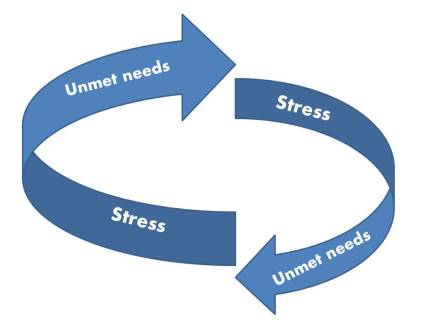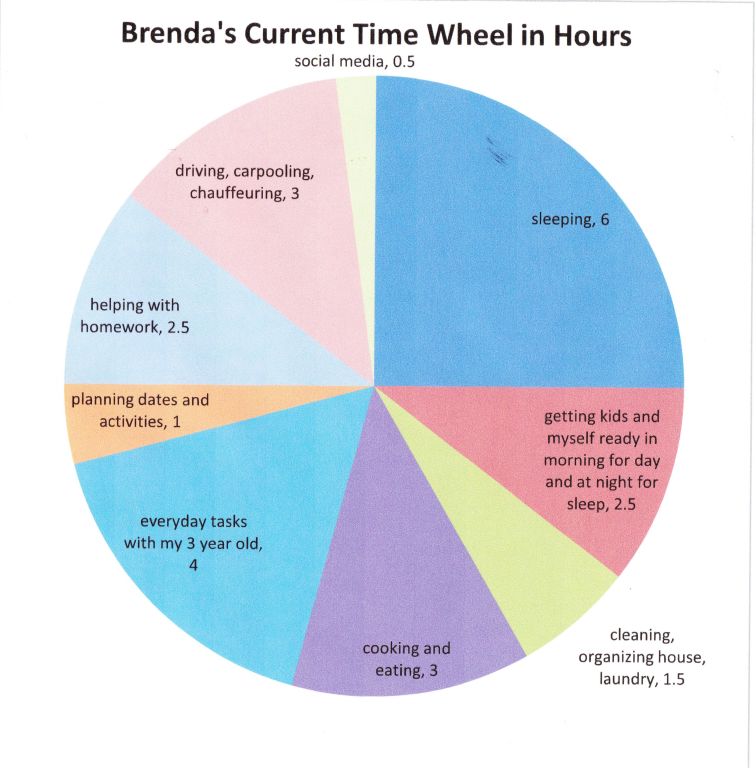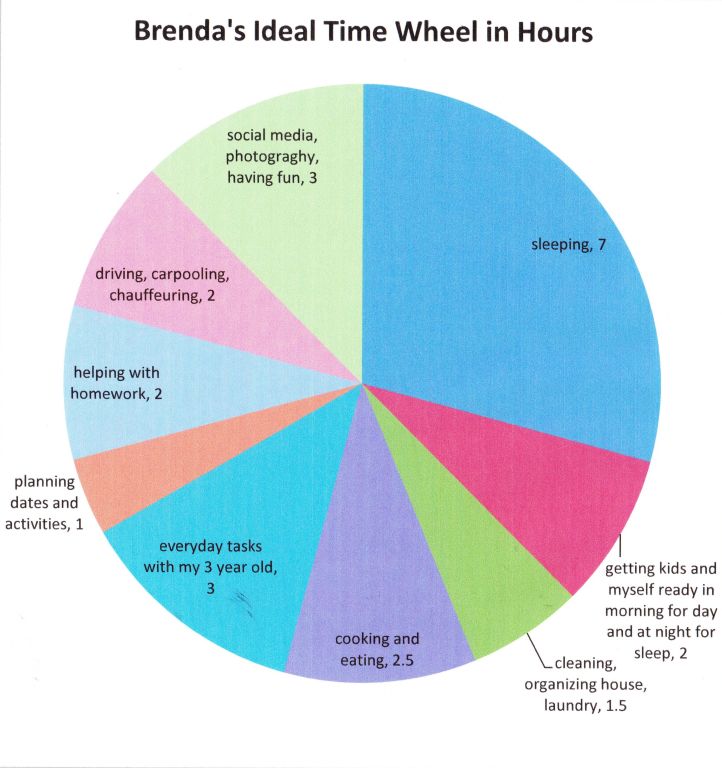So much of parenting has to do with meeting needs:
- those of your children,
- your spouse,
- and your own.
Additionally, parenting involves teaching your children how to meet some of their own needs and helping them understand that other people also have needs.
About Parents’ Needs
All people, no matter their age, have certain needs which can’t be denied without negative consequences.
-
You have to take care of physical needs (such as food, water, shelter).
-
You need a degree of intellectual stimulation of some sort.
-
You have a need for social contact with other people so as not to feel isolated.
-
You have emotional needs to feel loved, appreciated, and competent, to name a few.
Unmet Needs
There is a direct correlation between high stress and unmet needs. Needs become more acute in times of stress, and needs that are insufficiently met may cause stress.
-
If you feel burned out, you may become frustrated and find it difficult to be patient with your children and appreciate their needs.
-
As your children’s needs are not met, they may become more stressed.
-
This can result in a downward spiral of unmet needs, increased stress, and greater frustration.
If you feel depleted, exhausted, drained, and burned out, you will not feel like taking care of your children’s needs. You may feel resentful and not be physically or emotionally up to the task. You may miss out on the joys and pleasures of parenting your youngsters.
Times of High Stress
You may experience this vicious cycle very strongly during certain stages of parenting, such as when you have:
- a newborn,
- an active toddler,
- teens.
You may also feel increased stress and less able to handling your needs or those of your children during times of transition, such as:
- a divorce,
- move,
- or serious illness.
Reasons for Not Getting Your Needs Met
Unhelpful Thoughts
Certain beliefs may get in the way of your meeting your needs:
- Children’s needs always come first.
- I can only be happy when my children are . . . happy . . . well-behaved . . . quiet . . . minding me . . . doing well in school, etc.
- I have no right to to put myself first.
- I must be a “perfect” parent.
- I asked for this!
- I can do it better myself.
- I can not rely on anybody else to help me.
- It is too much work to get my needs met.
- It doesn’t count if I have to ask for help.
- Only other people can satisfy my needs; I can’t take care of myself.
- It is weak to have needs.
Circumstances
In addition there are certain parenting realities which are obstacles to getting your needs met.
- You may not even know what would make you feel better.
- You may not have enough support from other people.
- There may be time or money constraints holding you back.
“How can I fit in anything for myself when I am already doing as much as I can in a day. I have a toddler who is on the move all the time and a child in elementary school who has extra-curricular activities. Plus I am working part-time. When I get back from getting the older one where he has to be, I still have to cook dinner, help with homework, and do the bedtime routine…..”
You can fill in the details of your own life, but you get the picture. Doing something for yourself might feel like one more thing on your “to-do” list.
Your Upbringing
If you were shamed or criticized for having needs when you were a child or your needs were not met, you may believe that:
- it is not okay to have needs.
- your needs will not be met now.
- you do not deserve to have someone comfort you now.
In addition, if your needs were not met when you were a child, you may have trouble accepting and meeting your children’s needs because you it wasn’t modeled for you. You may be resentful of your children’s requests, or you may go overboard trying to satisfy every whim in an effort not pass on to them your childhood feelings of deprivation.
On the flip side, if your childhood history included you getting your needs predictably, you will probably:
- feel okay about having needs now and finding ways to meet them.
- be comfortable taking care of your children’s needs now.
- have the ability to meet your children’s needs graciously and deny some of their requests appropriately.
Children’s Needs vs. Wants
Parents often think that in order to be a good parent, they must put their own needs on a back-burner so they can meet all of their children’s requests. But there are some problems with this thinking.
Children do not know the difference between needs and wants.
Babies wants and needs are one in the same. And of course, you do try to meet all the needs of newborns and babies. It is their developmental job to learn that the world is a safe place, one in which they cared for and loved.
 It is your job as their parent to teach them that they are worthy by nurturing them and responding to their needs.
It is your job as their parent to teach them that they are worthy by nurturing them and responding to their needs.
However, as your children grow, it becomes your responsibility to teach them the difference between:
-
needs – those things they need to survive and develop in healthy ways, such as food, shelter, medical care, education, and some intellectual stimulation.
-
wants – those things they desire but are not essential, such as specific brand of food, designer clothing, extra classes, electronic devices used for recreation and entertainment, or play dates every day.
Meeting children’s needs is your obligation; satisfying some of their wants is a matter of choice and based on your values.
Children lobby for needs and wants with equal intensity.
For example, a two-year-old may tantrum just as intensely because you won’t give her a cookie as she would when she needs a drink of water because she is thirsty.
Your children need guidance from you to prioritize their wants and to learn to tolerate frustration and delay gratification in order to eventually function well in the world. You can do that by not meeting all their desires and saying “no” to some of their requests.
Children are not always good judges of their needs.
Not giving a four-year-old a snack that she is demanding just before dinner time will reinforce healthy eating habits. She wants the snack; she needs to eat nutritious food.
Not allowing a teen to drive with friends in his car when you don’t think he has the judgment and skill to handle distractions even though he is assuring you that he does is a way to keep him safe. He wants to have fun; he needs more experience behind the wheel.
You can acknowledge the request but know that you do not have to agree to it.
For healthy emotional development, sometimes children need to not get their wants met. Teaching a child to put her needs ahead of her wants is one of the greatest gifts parents can give.
Why It is Good to Get Your Needs Met
You are a better parent.
When you feel rested and on top of things, you can handle situations more effectively and with more patience; this includes responding to your children. You need a degree of physical and emotional well-being so you can preserve your most important resources – your energy and your good will.
Believing that your needs matter will free you up from unnecessary guilt and give you permission to distinguish more clearly between which of your children’s demands are truly essential for you meet and which you can and should deny. Instead of feeling selfish for denying a child’s request, you can view it as teaching healthy limits.
You are modeling self-care for your children.
How can you teach them to:
- ask for what they need,
- stick up for themselves,
- and disengage from negative relationships or interactions
if you don‘t practice such behavior yourself?
Many parents, especially mothers, have been conditioned not to speak up for themselves and not to think of their own needs. You may end up feeling resentful if the people around you can’t figure out on their own what you need.
By being assertive on your own behalf, you can increase the odds of getting what you need. Self-care means believing that:
- you deserve to have someone be there for you,
- it is okay to reach out,
- there is no shame in needing someone to lean on from time to time,
- you don’t need to do everything alone, including parenting your children.
These are critical beliefs for a parent to have to avoid feeling depleted and exhausted.
How You Can Get Your Needs Met
Making the changes that are in your and your family’s best interests will feel empowering to you and will be a step toward your being assertive on your own behalf. Below are ways to support yourself and re-charge your battery so that you can then more energetically take care of your family.
Abandon trying to be perfect
Aim for progress, not perfection. Remember that mistakes are opportunities to learn and to make changes in the future. Recognize them, apologize, make amends if needed, and then forgive yourself. Allow your children to make mistakes and learn from them as well.
Identify, understand and accept your own needs
Decide how well you are currently meeting your needs for each of the following categories:
- physically
- emotionally
- socially
- intellectually
- spiritually
- intimacy
For those categories where you are meeting your needs, congratulate yourself.
For those categories where you are NOT meeting your needs, take some time to consider what might “fill you up.” Know that it might take a bit of trial and error to figure which activities and how much time you need. If you are truly on empty, you may feel like a bottomless pit. Be kind to yourself as you figure out what works for you.
Make a list of people who can help you
Remember that you can be strong and still ask for help. Because friends and relatives cannot anticipate your specific needs, let the people in your support system know how they can help you. Tell them what you need and how they can best respond:
- Do you need some childcare assistance?
- Do you need someone to listen to your feelings and give you a chance to vent?
- Do you need help with chores?
- Do you need people who will do something fun with you?
You may face resistance or criticism from certain people within your family and friend network who are happy with the status quo because things are currently working well for them.
You will need people who will:
- listen without judging you.
- respect your needs.
- appreciate your efforts to care for yourself.
Specific tips
-
At the beginning of the day, create a “to-do” list that includes something for yourself even if it is only for 10 or 15 minutes. A small turn is better than no turn at all.
-
At the end of the day, write down everything you accomplished in the day—create a “Done” list and congratulate yourself for your efforts, successes, and what you have done well, no matter how small.
-
Give yourself affirming messages. You can even keep a “Positive Journal” to record the moments that went well.
-
If child care is an obstacle for you, find a babysitter, mother’s helper, or someone with whom you can take turns babysitting.
-
Lower household cleaning standards, delegate tasks to other family members, eliminate some tasks, and pay for some services. You don’t have to do it all yourself to be a good mother.
-
Do something fun with your children. This will enliven your relationship, increase optimism and joyfulness, and be great modeling for your children.
On the other hand, accept your feelings about not wanting to do certain things for or with your children; for example, if you don’t like playing board games, don’t play them.
Celebrate the things you do love to do with and for your children; for example, doing crafts or playing basketball.
-
Do something fun with other adults. Personal relationships can minimize isolation and can bring joy into your life.<>
-
Develop interests and hobbies as “de-stressors.” The more fulfilled you are as a person, the more energy you will have for your children and the less you will use your children to fulfill your needs.
-
Discover and use calming techniques that work for you – music, a bath, meditation, reading, massage, etc.
-
Set firm limits and personal boundaries. Learn to say, “No!” to others and “Yes!” to yourself.
-
Adopt a healthy lifestyle and take care of your body (this includes healthy eating, sleeping, and exercising).
-
Know the importance of time management. Set priorities and reasonable expectations. Structure your time.
Take time to do things you enjoy
What you enjoy may surprise you, especially since it may have been a long time since you have done things you like to do. In order to be good to your children, you really need to be good to yourself; and if you want your children to have fun, you need to model having fun.
You may feel that you don’t have enough time to do all the things you want to do. And you probably won’t have that luxury, at least while your children are small. But you can carve out some time to do some things you find pleasurable, thereby “taking your turn.”
Following are two related exercises, inspired by Elizabeth Crary in her book, Without Spanking or Spoiling, you can do to help you solve the “time dilemma:”
Exercise One:
Make a list of five to ten things you enjoy doing. What people, places, things, and activities fill you up? Be specific. Consider:
- What help so you need from others?
- Do you need child care or can you include your children?
- How much money does it require?
Exercise Two:
Fill out two different time wheels, the first indicating how you currently spend your time in a day and the second reflecting how you would like to spend your time. Here are two time wheels completed by a mom of three children:
Brenda’s current time wheel:
| 6 hours | sleeping |
| 2½ hours | getting kids and myself ready in morning for day and at night for sleep |
| 1½ hour | cleaning, organizing house, laundry |
| 3 hours | cooking and eating |
| 4 hours | everyday tasks with my 3 year old |
| 1 hour | planning dates and activities |
| 2½ hours | helping with homework |
| 3 hours | driving, carpooling, chauffeuring |
| Time for me | 1/2 hour |
| ½ hour | social media |
Brenda’s ideal time wheel:
| 7 hours | sleeping |
| 2 hours | getting kids and myself ready in morning for day and at night for sleep |
| 1½ hour | cleaning, organizing house, laundry |
| 2½ hours | cooking and eating |
| 3 hours | everyday tasks with my 3 year old |
| 1 hour | planning dates and activities |
| 2 hours | helping with homework |
| 2 hours | driving, carpooling, chauffeuring |
| Time for me | 3 hours |
| 1 hour | social media |
| ½ hour | exercising |
| ½ hour | talking to friends |
| 1 hour | either cooking, doing something fun with my kids, taking pictures |
When Brenda did this exercise, she gained a fuller picture of the things she would really like to do and how she could better fit these into her life. She realized she could:
- arrange for more carpooling for her older children so she wasn’t always doing the driving;
- look into swapping babysitting friend who also has a three-year-old;
- enlist her husband’s help with the bedtime routine with the children so that she did not have to spend so much time each night doing that;
- set out clothes and pack lunches the night before;
- wait until some laundry piled up so she did not have to do it every day.
- cook in larger batches, use some prepared foods, spend some time on the weekend cooking for the weekday nights, and arrange with a close friend for each of them to cook enough for two families once a week.
- set limits on how much time she spent with the older children on homework, letting them know she would be available for a certain amount of time each day.
These changes gave Brenda an extra hour to sleep each night, time to exercise, talk to friends, and have time to do something fun with her kids or engage in some other activity that would be pleasurable and relaxing for her.
Even if all of these things did not happen every day, she would still be ahead of the game, and feel like she was replenishing her energy supply, her good will, and the joy she wanted to feel from parenting her children.
Click here to print out your own timewheels to complete reflecting your current time usage and what your ideal use of time during the day would be.
Healthy Messages to Tell Yourself
It is okay to have needs. My needs are important and it is essential to focus on getting some of them met. I deserve to have some of my needs and wants met. I’m not selfish; I am entitled to take care of myself.
It is okay if I don’t know exactly what I need or how to take care of it; I can work to figure this out.
I can take responsibility and be assertive in getting my needs met.
I can get my needs met from other adults. It is okay to ask for help.
It is important to have interests other than my children to build my self-esteem.
Kids are better off if parents’ needs are met.
Taking care of myself is good modeling for how my children can act as adults.
My needs can be in conflict with each other and with other people’s needs. I can prioritize which ones I attend to.
Imperfect is okay. The perfect parent is a myth.
I don’t have to defend what I need.
Doing everything for my children is not the best thing for them in terms of their long-range development. When my children learn to delay gratification or complete tasks on their own, they become more competent, resilient, responsible, grateful, and empathetic. It is okay and even healthy to deny children some of the things they want us to do for them.
Remember that your needs are important and that you deserve to get some of them met, even while you are primarily focused on taking care of other people. Your children will be better off if they have a parent who models self-care and who has the energy to care for them. And you will be more likely to experience the joy, satisfaction, and fulfillment that parenting can bring you.
____________________________________________________________
For more information about getting your needs met check out the following book. Purchasing books from our website through Amazon.com supports the work we do to help parents do the best job they can to raise their children.
<all our recommended parenting books
___________________________________________________________
<return to top of page




